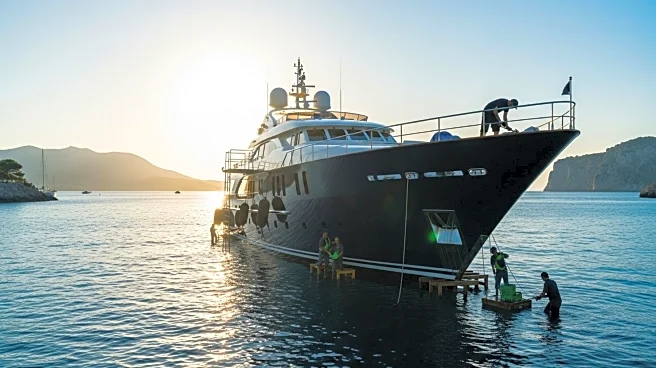What's Happening?
Mark Zuckerberg, CEO of Meta, has chosen the La Ciotat shipyard in France for repairs on his $300 million yacht, 'Launchpad'. This decision has drawn attention due to the yacht's significant environmental impact. The vessel has consumed approximately two million liters of diesel and emitted 5,300 tonnes of CO2 in less than a year, equivalent to the emissions from over two thousand cars. The La Ciotat shipyard is renowned for its expertise in servicing luxury yachts, attracting wealthy clients like Zuckerberg. However, the environmental footprint of such vessels is increasingly scrutinized, especially as the Mediterranean region faces the direct consequences of climate change.
Why It's Important?
The repair of Zuckerberg's yacht in France underscores the tension between economic benefits and environmental responsibilities. While the presence of such luxury vessels supports local industries, it also raises questions about ecological sustainability. The emissions from 'Launchpad' highlight the broader issue of the environmental impact of luxury lifestyles, particularly among tech billionaires who often advocate for sustainability. This situation reflects a growing public discourse on the privileges of the ultra-wealthy and their environmental accountability, especially as Europe pushes for energy conservation and climate action.
What's Next?
The repair of Zuckerberg's yacht may prompt further debate on the environmental responsibilities of the wealthy, particularly in regions like the Mediterranean that are vulnerable to climate change. As public awareness and criticism of such practices grow, there may be increased pressure on luxury service providers to adopt more sustainable practices. Additionally, policymakers might face calls to implement stricter regulations on the environmental impact of mega-yachts and similar luxury assets.
Beyond the Headlines
This event highlights a broader cultural and ethical debate about the lifestyle choices of the ultra-rich and their alignment with global sustainability goals. The contrast between the environmental rhetoric of Silicon Valley elites and their personal practices could lead to increased scrutiny and demands for transparency and accountability. The situation also reflects the challenges faced by regions like France in balancing economic interests with ecological commitments.










